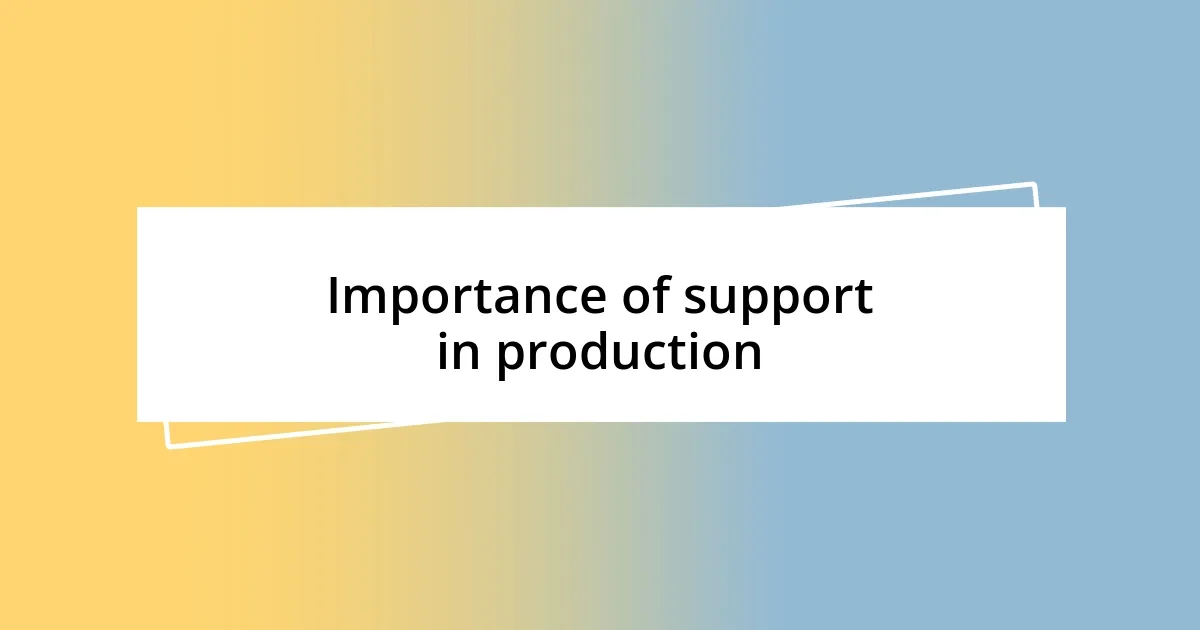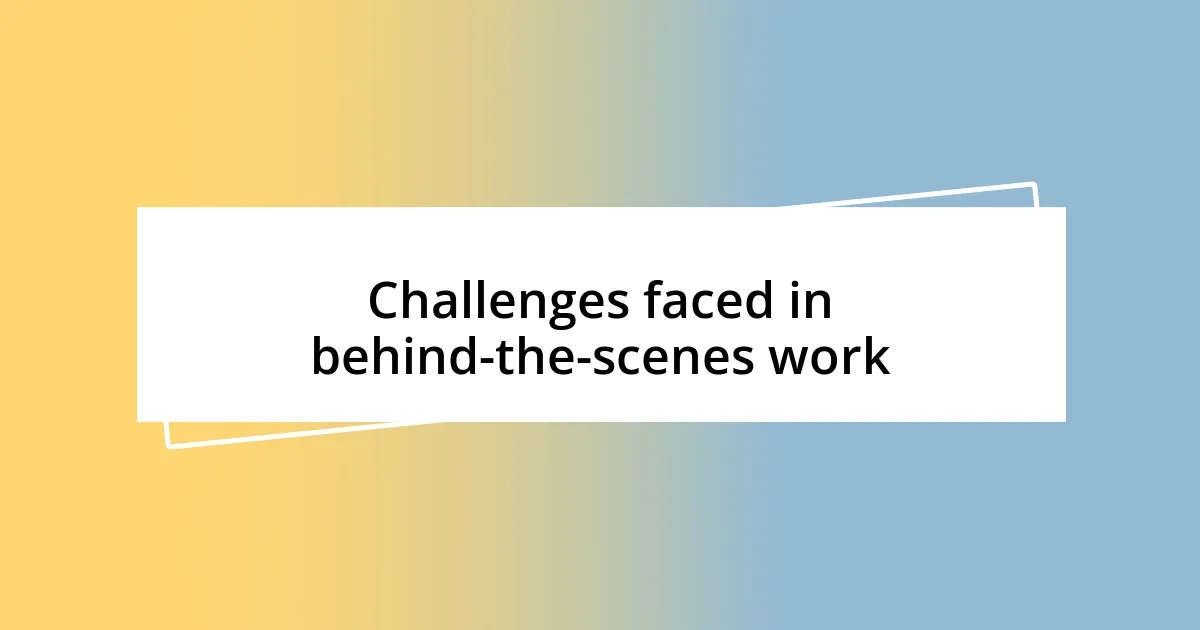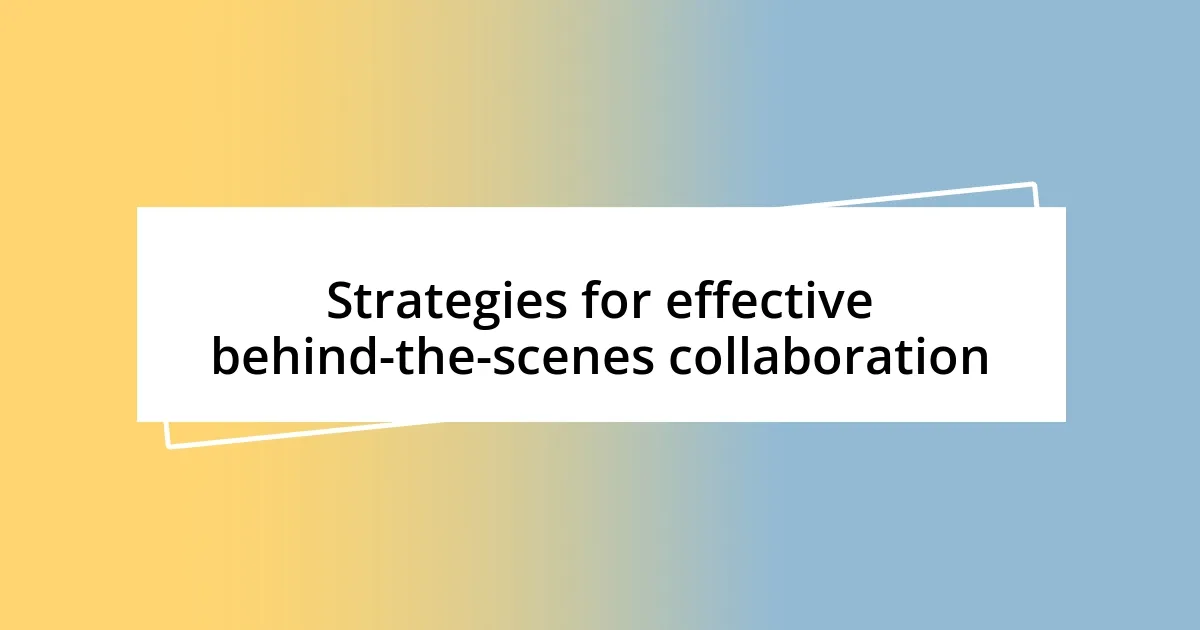Key takeaways:
- Behind-the-scenes roles, such as stage managers and sound technicians, are crucial for the smooth operation and success of productions, often going unrecognized.
- Effective collaboration relies on clear communication, adaptability to changes, and fostering mutual respect within the team.
- Challenges like time constraints and resource limitations can impact behind-the-scenes work, highlighting the need for resilience and strong problem-solving skills.
- Networking and taking initiative in various roles can create opportunities in behind-the-scenes careers, emphasizing the importance of skill development and proactivity.

Understanding behind-the-scenes roles
Behind-the-scenes roles are often the unsung heroes of any production, quietly ensuring everything runs smoothly. I remember my first experience working behind the curtain at a theater; the palpable energy was mesmerizing, yet everything felt chaotic. Have you ever wondered how vital these roles are in shaping the final product?
Each role, whether it’s a stage manager, sound technician, or costume designer, contributes a unique layer that enhances the overall experience. Once, while assisting a lighting technician, I witnessed how a single change in lighting could transform a scene’s mood entirely. Isn’t it fascinating how a flick of a switch can evoke such strong feelings?
It’s easy to overlook the dedication and skill that go into these roles, but they often carry the weight of the production on their shoulders. Just think about the countless hours spent rehearsing, adjusting, and perfecting elements that the audience may never fully appreciate. It made me realize that behind every great performance is a team that thrives in the shadows, their passion fueling the spectacle.

Importance of support in production
Support in production is essential to create a seamless experience that audiences may not fully recognize. I recall assisting in a film production where the grip team worked tirelessly, moving heavy equipment in perfect synchronization. Their unwavering support allowed the director to focus on the creative aspects without worrying about logistical issues—talk about a vital foundation!
Consider this: when a sound engineer expertly balances audio between dialogue and background music, the audience remains blissfully unaware of the complex work that goes into it. I remember sitting in on a post-production session, where every adjustment felt like fine-tuning a masterpiece. It’s a delicate dance, and without that behind-the-scenes support, the production could easily fall flat.
The significance of these roles becomes even clearer when things go wrong. I once watched a stage manager calmly handle a last-minute prop malfunction during a live performance. Their composure not only saved the show but also allowed the actors to deliver their lines without missing a beat. This experience solidified my belief that support in production is the unsung glue that holds everything together, often going unnoticed yet profoundly impactful.
| Aspect | Example from Production |
|---|---|
| Support Role | Grip Team |
| Key Contribution | Logistical support and setup |
| Clarity Cues | Sound Engineer |
| Key Contribution | Balancing audio levels |
| Emergency Management | Stage Manager |
| Key Contribution | Handling last-minute issues |

Challenges faced in behind-the-scenes work
There’s an undeniable intensity in behind-the-scenes work that often leads to unique challenges. I remember a time when I was part of a team that had to set up an event on an extremely tight schedule. The pressure was palpable, and it became clear that juggling multiple tasks meant something was bound to go wrong. The adrenaline rush was exhilarating, but the constant need to adapt felt overwhelming.
Some of the common challenges faced in behind-the-scenes roles include:
- Time Constraints: Tight deadlines often lead to rushed work and increased stress.
- Communication Breakdowns: Misunderstandings can happen easily in high-pressure environments, impacting teamwork.
- Limited Resources: Working with a constrained budget or insufficient equipment can hinder efficiency and creativity.
- Emotional Resilience: It takes a strong mindset to handle the ups and downs, particularly when unexpected issues arise.
- Balancing Multiple Responsibilities: The need to wear many hats can lead to burnout if not managed carefully.
The experience taught me that resilience is key. Sometimes, I found it hard to manage my feelings when everything felt chaotic, but it’s those moments that sharpen your skills and deepen your appreciation for the role you play.

Strategies for effective behind-the-scenes collaboration
When it comes to effective collaboration behind the scenes, communication is crucial. I’ve learned that a simple daily check-in can make a world of difference. During a recent project, my team and I established a quick morning huddle where we laid out our priorities for the day. It not only kept everyone aligned but also created a sense of camaraderie that boosted our morale.
Equally important is the ability to adapt to unforeseen changes. I once worked on a documentary shoot where a storm threatened our schedule. Instead of panicking, we brainstormed alternative plans on the spot. This flexibility not only saved the day but also reminded me how powerful it is to have a team that can think on its feet. How do you handle sudden changes in your work?
Moreover, fostering a culture of mutual respect is vital for collaboration. I remember working with a graphics designer who always took the time to explain technical concepts. Their patience helped demystify the creative process and made me appreciate the art involved in their role. Building these relationships creates trust, ensuring that everyone feels valued and heard, which ultimately leads to a more harmonious workflow.

Appreciating the unsung heroes
When I think about unsung heroes in behind-the-scenes roles, I often recall my experience working on a theater production. The stage managers, often unnoticed in the spotlight, juggle countless responsibilities, yet their calm presence anchors everyone around them. It’s easy to overlook how their meticulous planning and coordination create a seamless experience for audiences. Have you ever considered how much these individuals contribute to the magic we see on stage?
There was a time when I witnessed the efforts of a sound technician during a live event. The audience was captivated, unaware of the constant adjustments being made to balance audio levels and ensure every note was clear. I remember feeling awe the moment I realized how crucial their behind-the-scenes work is in shaping the audience’s experience. It’s a reminder that, without them, the glamour of the event would crumble, making me appreciate their dedication all the more.
Recognizing the importance of these roles enhances our collective appreciation for the entire process. I vividly recall a friend of mine, who was part of a film crew, spending long nights ensuring all the equipment was ready for shooting. Their hard work often faded into the background, yet it was their passion and commitment that illuminated the film on screen. Isn’t it fascinating how a little recognition can turn our perception of these roles from mundane to extraordinary?

How to pursue behind-the-scenes opportunities
It’s essential to start by building a network. I remember during my early days, I reached out to people in the industry through social media and attended local workshops. This opened doors I never imagined possible. Have you ever considered how a single conversation could spark a new opportunity?
Once I secured some entry-level positions, I realized the importance of being proactive. One time, while assisting on set, I took the initiative to help with tasks outside of my assigned role. By offering to handle equipment and coordinate schedules, I impressed my colleagues, which led to recommendations for future projects. Isn’t it interesting how going the extra mile can highlight your commitment?
Furthermore, always look for ways to improve your skills. I took online courses in areas like production management to bolster my understanding and increase my value in behind-the-scenes roles. It’s incredible how learning a new skill can empower you, creating further opportunities that align with your passions. What additional expertise could you cultivate to enhance your chances in this field?














